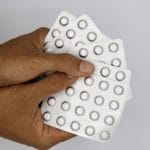- What Is Desoxyn?
- Effects Of Desoxyn Abuse
- Signs Of Desoxyn Addiction
- Desoxyn Addiction Treatment
- FAQs
Desoxyn (methamphetamine hydrochloride) is an addictive drug with a high potential for abuse. It’s classified as a schedule II controlled substance by the US Drug Enforcement Administration (DEA).
While Desoxyn has some medical uses, abusing it increases the risk of side effects, overdose, and addiction.
What Is Desoxyn?
Desoxyn is a brand name for methamphetamine pills approved by the US Food and Drug Administration (FDA) to treat attention deficit hyperactivity disorder (ADHD) and obesity.
This prescription drug works similarly to other stimulant medications, such as Ritalin (methylphenidate), Adderall (dextroamphetamine/amphetamine), and Vyvanse (lisdexamfetamine).
Stimulant drugs speed up the central nervous system (CNS) and increase pleasurable brain chemicals like norepinephrine and dopamine. Mental stimulation helps people with ADHD concentrate on what they’re doing rather than seeking outside stimulation.
Where To Get Desoxyn
You should only get Desoxyn (methamphetamine) at a registered pharmacy with a prescription from a licensed healthcare professional. Even online pharmacies can be illegitimate and may sell counterfeit Desoxyn pills. Buying it on the street or from an acquaintance is just as risky.
Desoxyn generic is also available at many pharmacies and may be a better prescribing option depending on your insurance (or if you don’t have insurance).
Effects Of Desoxyn (Methamphetamine) Abuse
Desoxyn can be helpful if you use it as prescribed. Your doctor may recommend it one to two times a day for ADHD or short-term for weight loss.
If you take it more than prescribed—higher doses, more frequent doses, or for a longer duration—you raise the risk of side effects, long-term health effects, and becoming addicted.
Side Effects Of Desoxyn Abuse
Many people experience side effects when taking a drug even as prescribed. Always tell your doctor if side effects are severe, persistent, or disruptive to your quality of life.
Common side effects of Desoxyn (methamphetamine) include:
- dry mouth
- unpleasant taste
- headaches
- upset stomach
- constipation
- loss of appetite
- weight loss
- restlessness
- itching
- changes in sex drive
- insomnia (difficulty sleeping)
Some serious side effects of Desoxyn are:
- rapid heart rate
- intense fatigue
- difficulty speaking
- seizures
- vision changes
- motor or verbal tics
- hostile or aggressive behavior
- paranoia or suspicion of others
- hallucinations (seeing or hearing things that aren’t real)
- delusions (believing untrue things)
- mania (abnormal excitement)
- unexplained wounds on toes or fingers
Desoxyn Contraindications & At-Risk Conditions
If you abuse Desoxyn with certain other drugs or if you have a pre-existing medical condition, you increase the risk of adverse health effects.
Desoxyn drug interactions can result from taking it with:
- medication for high blood pressure
- tricyclic antidepressants, like desipramine (Norpramin) or protriptyline (Vivactil)
- monoamine oxidase inhibitors (MAOIs), such as linezolid (Zyvox)
- selective serotonin reuptake inhibitors (SSRIs), like fluoxetine (Prozac)
- some supplements, such as those containing glutamic acid (L-glutamine)
Medical conditions that can cause complications with Desoxyn use include:
- Tourette’s syndrome
- hypertension (high blood pressure)
- hyperthyroidism
- irregular heartbeat
- recent heart attack/heart problems
- glaucoma
- bipolar disorder (or family history)
- depression or anxiety
- history of drug abuse
Long-Term Effects Of Desoxyn Abuse
Desoxyn (methamphetamine) abuse can have devastating long-term effects on your health.
People who take high doses of methamphetamine often experience increased anxiety, confusion, and mood disturbances. They frequently have trouble sleeping since methamphetamine is a central nervous system stimulant.
Up to 40 percent of people who abuse methamphetamine develop methamphetamine-induced psychosis. This condition is temporary for some, but for others, the symptoms last for months or years after meth abuse stops and may be triggered by stressful situations.
Signs of methamphetamine psychosis include paranoia, hallucinations, and delusions. A common delusion with meth abuse is the sensation of insects crawling under the skin (“meth mites”).
Desoxyn abuse can cause dry skin and itching, which may lead to open sores. Continued itching and meth use prevent these sores from healing. Methamphetamine also dries out the mouth, which—when paired with poor hygiene—can cause severe tooth decay.
If you abuse Desoxyn, you’re likely to become addicted to it. Since this CNS stimulant drug targets neurotransmitters in the brain’s reward system, taking it prevents the brain from producing its own “feel-good” chemicals.
The more you abuse Desoxyn, the more your brain will likely need it to feel normal.
Signs Of Desoxyn (Methamphetamine) Addiction
Side effects and long-term health effects are good indicators of Desoxyn addiction. But there are other physical, mental, and behavioral signs that someone is suffering from addiction.
Signs of Desoxyn (methamphetamine) addiction may include:
- withdrawing from family and friends
- spending time with people who use drugs illicitly
- unmarked pill bottles or multiple Desoxyn prescriptions from different doctors
- needing Desoxyn to get through the day (if they don’t have ADHD)
- unexplained financial struggles
- borrowing or stealing money to pay for drugs
- poor performance at school or work, possibly resulting in failing grades or job loss
- withdrawal symptoms (depression, anxiety, fatigue, cravings) when they don’t take Desoxyn
If you recognize the signs of addiction in a loved one, don’t ignore them. Addiction can destroy their life. Approaching them lovingly with genuine concern (not judgment) could open a conversation that leads to healing.
Desoxyn (Methamphetamine) Addiction Treatment
The most effective treatment for Desoxyn addiction is a comprehensive and personalized rehab program. Addiction affects your body, mind, and spirit. It’s essential to address all these areas during recovery and that you learn tools to avoid relapse for life.
It’s also vital to resolve the root of substance abuse, not just the symptoms. Addiction often stems from trauma or an inability to deal with stress. If you don’t work through these issues, you’re likely to relapse, no matter how great you felt during the recovery program.
Effective Desoxyn (methamphetamine) addiction treatment may include a combination of:
- Cognitive-behavioral therapy examines negative thought patterns that lead to unhealthy behavior (substance abuse).
- Support groups provide a safe space for people to gain perspective and share their addiction experiences with others who are going through the same thing.
- Group therapy encourages addicted individuals to work together toward the goal of recovery while guided by a licensed therapist.
- Exercise and recreation encourage physical healing and positive bonds through teamwork.
- Nutritional support helps you nourish your body and strengthen it rather than weaken it with drug abuse.
- Yoga and meditation teach relaxation and stress management techniques that you can turn to instead of substance abuse.
- Art therapy encourages creative expression that connects you with your inner self and emotions.
At Northeast Addictions Treatment Center, we offer customized outpatient treatment programs for Desoxyn (methamphetamine) addiction.
It’s never the wrong time to start healing from addiction. Whether you’re looking for a personal recovery program or wondering how to help a loved one, we’re here for you. Reach out to one of our treatment specialists today to learn more.
FAQs
How Much Does Desoxyn Cost?
When prescribed by a doctor, Desoxyn typically costs around $570 for 30 pills, $1,180 for 60 pills, and $1,800 for 90 pills. The exact price depends on your pharmacy and insurance.
When bought illegally on the street, Desoxyn usually costs between $2 to $50 per pill. It tends to cost less in big cities, where higher supply leads to lower prices.
Learn more about Desoxyn Street Prices & Prescription Costs
Can Desoxyn Be Abused If You Have ADHD?
Yes, Desoxyn can be abused if you have ADHD. ADHD patients who abuse Desoxyn may be at higher risk for heart problems, psychosis, substance use disorders, and other serious health effects.
Learn more about ADHD & Desoxyn Abuse
Is Desoxyn Similar To Illegal Methamphetamine?
Both the prescription medication Desoxyn and street methamphetamine contain the same active ingredient.
However, Desoxyn is produced in a controlled environment with pharmaceutical purity and exact dosing, allowing it to act as a safe and effective medication when used as prescribed.
To learn more, read Is Desoxyn Meth?
Can You Get High On Desoxyn?
Desoxyn is a prescription drug containing pharmaceutical methamphetamine, a long-acting stimulant drug often produced and abused illegally.
If misused, Desoxyn can generate a methamphetamine high, which tends to be intense, long-lasting, addictive, and dangerous.
Learn more about A Desoxyn High
What’s The Difference Between Desoxyn & Dexedrine?
Both of these prescription stimulant medications are used to treat ADHD and narcolepsy.
However, Desoxyn (methamphetamine) is reserved for second-line treatment of ADHD and obesity and has higher relative abuse potential than Dexedrine (dextroamphetamine), which is used as a preferred treatment for adult ADHD and narcolepsy.
Learn more about Desoxyn Vs. Dexedrine
How Long Does Desoxyn (Methamphetamine) Stay In Your System?
Desoxyn can stay in your system for about 50 hours after the last dose. Drug testing can detect Desoxyn use for weeks or even months after the last dose.
Learn more about How Long Desoxyn Stays In Your System
Sources
Written by
Northeast Addition Editorial Team
©2024 Northeast Addition Center | All Rights Reserved
This page does not provide medical advice.





